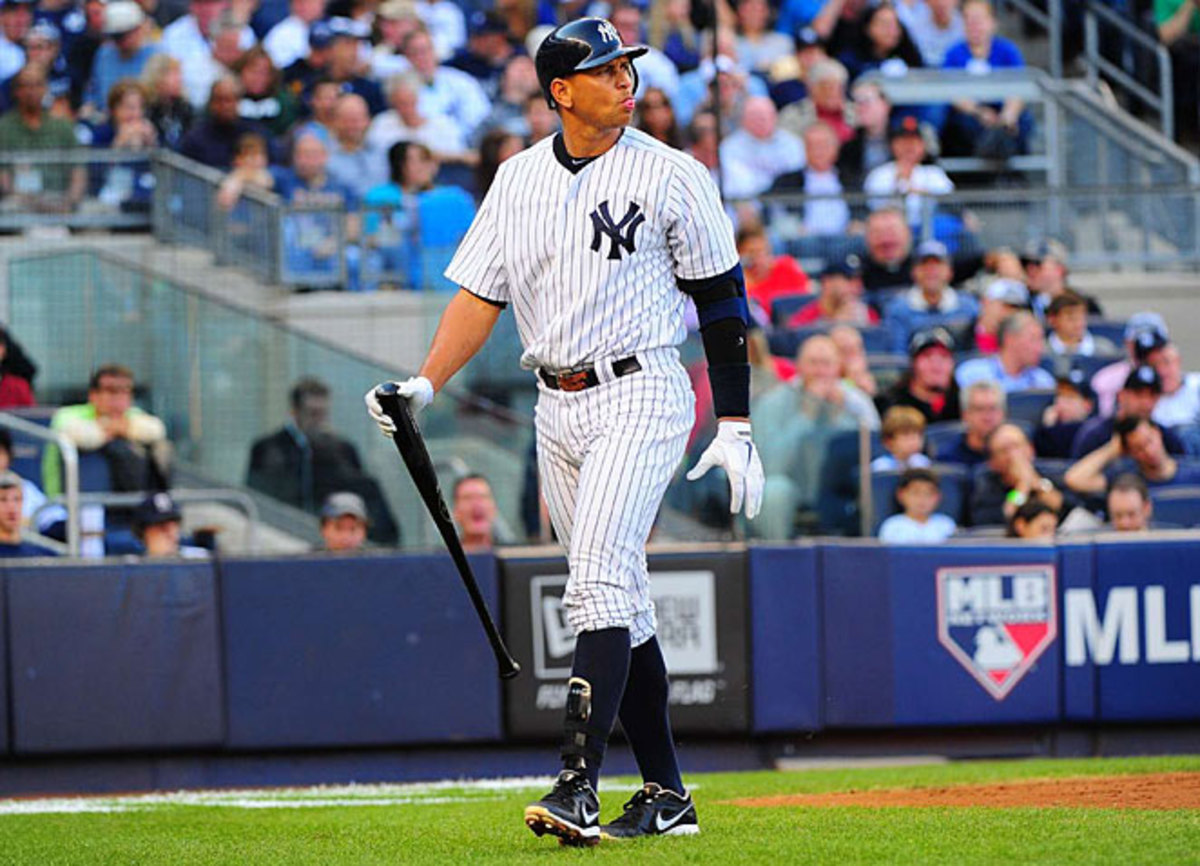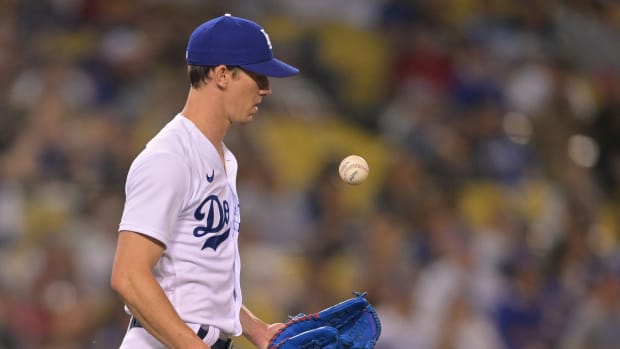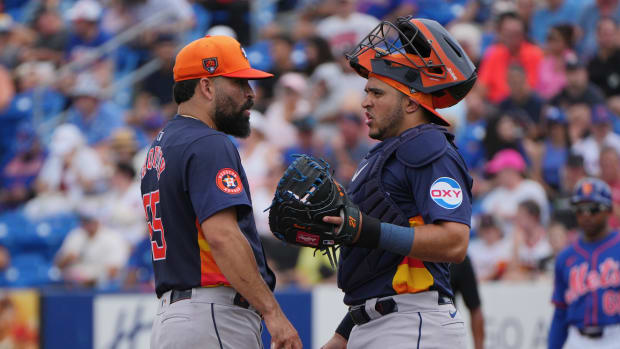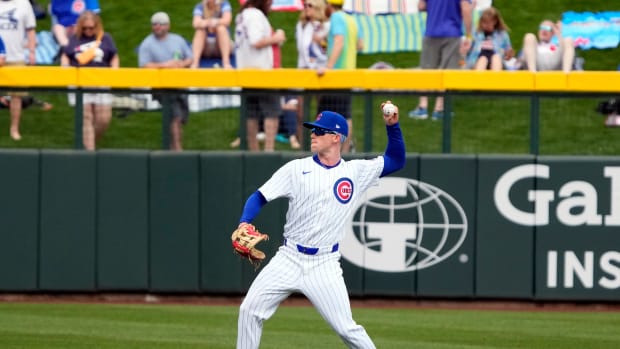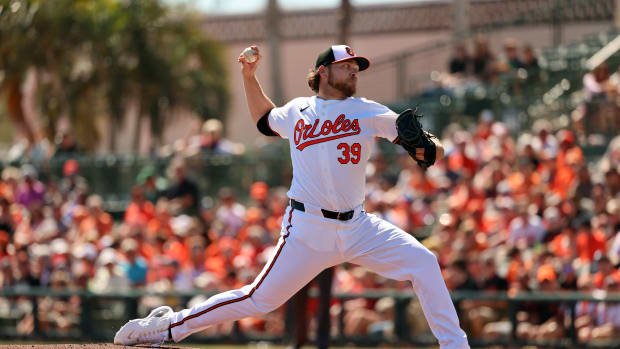Steroid Era, A-Rod won't go away but give MLB a break here

Alex Rodriguez's decline as a player is now the least of his worries as spring training gets closer.
Al Tielemans/SI
Alex Rodriguez and Major League Baseball have taken their share of hits during the ongoing Steroid Era, and while the former saw his fortunes sink further on Tuesday, the latter is looking a little better for a change.
In recent years, Rodriguez already had admitted to using performance-enhancing drugs, while becoming an aging infielder who had trouble staying healthy and is now barely an above-average player.
In just the last four months, however, Rodriguez has encountered additional problems. He was a playoff punch line in October after a 3-for-25 postseason in which he struck out 12 times and was pinch-hit for in the ninth inning of a one-run game, only to see his replacement deliver the heroic game-tying and game-winning home runs. Then in December news broke of a major hip surgery that would sideline him for at least half of the 2013 season.
Most recently and most profoundly, on Tuesday came a report from the Miami New Times alleging that Rodriguez purchased performance-enhancing drugs from Biogenesis, an anti-aging clinic in South Florida run by a man named Anthony Bosch. In 2009, Rodriguez confessed to using PEDs from 2001 through 2003 with the Rangers, but this new report alleges evidence that Rodriguez was mentioned in Bosch's records from 2009 through 2012 when he was a Yankee. This revelation has prompted the Yankees to explore ways they could void the five years and $114 million remaining on the 37-year-old's contract, according to ESPNNewYork.com.
Rodriguez denied the allegations in a statement released by his public-relations firm, saying he "was not Mr. Bosch's patient, he was never treated by him and he was never advised by him. The purported documents referenced in the story -- at least as they relate to Alex Rodriguez -- are not legitimate." A spokesman added, "Alex Rodriguez denies taking PEDs during the time frame described by the story."
Bosch also released a statement of denial, according to the New York Times, saying the Miami New Times article was "filled with inaccuracies, innuendos and misstatements in fact."
A statement released by the Yankees acknowledged support for the Commissioner's drug program but did not offer the same support -- or even any mention at all -- of Rodriguez.
Rodriguez was one of seven professional ballplayers named in the Miami New Times report as having been Biogenesis clients, along with three players who have previously been suspended by Major League Baseball for failed PED tests (new Blue Jays outfielder Melky Cabrera, Athletics starter Bartolo Colon and Padres catcher Yasmani Grandal) as well as three new names -- Nationals starter Gio Gonzalez, Rangers rightfielder Nelson Cruz and pitcher Cesar Carrillo, who was a Tigers minor leaguer last year. (The Miami New Times reported that none of the players responded to requests for comment.)
Cruz denied wrongdoing in a statement released through his lawyer, according to the AP.
Gonzalez reportedly purchased Aminorip, a muscle-building protein that doesn't include any ingredients that are banned substances, according to mlb.com. Gonzalez denied using PEDs and knowing Bosch on Tuesday, saying on Twitter, "I've never used performance enhancing drugs of any kind and I never will. I've never met or spoken with Tony Bosch or used any substance provided by him. Anything said to the contrary is a lie."
Major League Baseball has suffered its share of indignities because of the Steroid Era: reacting slowly to a growing problem, issuing the heavily criticized Mitchell Report (which was maligned for being incomplete and seemingly ineffectual) and watching as cherished milestones were reached and records set by players later linked to PEDs. Just three weeks ago, a Hall of Fame ballot brimming with statistically deserving players failed to produce a single inductee.
But perhaps it's time that thinking changed somewhat. In this case Major League Baseball -- through its Department of Investigations, which was created on the recommendation of the Mitchell Report -- was already aware of the clinic in the Miami area. Soon after the Miami New Times report was published, the league released a statement that began as follows:
"We are always extremely disappointed to learn of potential links between players and the use of performance-enhancing substances. These developments, however, provide evidence of the comprehensive nature of our anti-drug efforts. Through our Department of Investigations, we have been actively involved in the issues in South Florida."
We don't have to take just MLB's word for it. The New York Daily News, citing a law-enforcement source, reported on Saturday that a league investigation into Anthony Bosch was already underway. The league's investigation is continuing, and the players named by the Miami New Times will likely be interviewed about the allegations. The league's capacity to conduct such an investigation comes from a recommendation of the Mitchell Report, which wrote that "the Commissioner should establish a Department of Investigations."
In explaining the rationale for such a unit, the Mitchell Report wrote, " . . . the Commissioner's Office should place a higher priority on the aggressive investigation of non-testing (so-called "non-analytic") evidence of possession or use, enhance its cooperation with law enforcement authorities, and make other improvements designed to keep performance enhancing substances out of major league clubhouses."
Catching drug cheats is an inherently reactive endeavor -- one has to have cheated to be caught, of course -- but the league can still be pro-active in its deterrence. Such an investigation as the one in South Florida is an example, in which Major League Baseball recognized a pattern among recent positive tests, as SI's Tom Verducci reported on Tuesday. Disrupting supply chains can make a difference. Even without failing a test, a player can be suspended for those non-analytic positives, which fall under the drug program's "just cause" umbrella and could include records of PED purchases.
Furthermore, the league, which does not have subpoena power, recently strengthened its drug-testing program -- which was already the toughest in U.S. pro sports -- to include in-season HGH testing and baseline readings of testosterone, doing so in the middle of a collective bargaining agreement. With an active CBA, there was no pressing deadline to revisit the drug issue, but the league and players' association made the improvements anyway, which is a testament to their shared strong commitment to playing a clean game.
More can be done, of course, including lengthening the suspensions for violations, but for Major League Baseball, this investigation is evidence of its progress in cleaning up the sport -- there's a long way to go, but it's a start. For Rodriguez and his career, however, this allegation could be the beginning of the end of him as a productive player.
Of course, there had once been the chance, and maybe even the hope, that Rodriguez, who sits fifth on baseball's career home run list, would restore the purity of the home run crown. That vanished first with A-Rod's admission back in '09 and then with the decline in his play. Now, no matter how long he puts on a uniform, he will serve as yet another reminder that the Steroid Era remains as much a part of the game's present as its past.
VERDUCCI: Plenty of questions remain for A-Rod and MLB






























